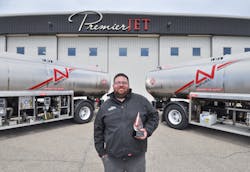Brian Bourbeau: 2021 Team Leader of the Year
As Premier Jet Center has switched hands from one ownership group to another, many changes have occurred.
For one, business doubled for five consecutive years from 2015 through 2019, and even through the turmoil brought on by the COVID-19 pandemic, the FBO saw business remain steady throughout 2020. With that growth, staffing and equipment needs have grown, too.
But throughout this period of change, one thing has remained constant – the leadership that Brian Bourbeau brings to the line service department.
As the FBO, located at Flying Cloud Airport (KFCM) in Eden Prairie, Minn., has grown, Premier Jet Center’s line services manager has grown his career with it, developing professionally while overseeing a rapidly expanding team.
“He has developed the team and with that created four supervisor positions. This has allowed continued growth opportunities for team members and created a focus on developing the supervisors in order for them to get leadership experience,” says Michael Lawrence, general manager at Premier Jet Center.
“Through his leadership and the respect of the entire line service department team, Premier Jet Center’s line department has been consistently highly rated in FBO surveys, has grown both our based tenant and transient customer base, reduced overall turnover in the department and has significantly increased the team member job satisfaction,” he adds.
For his ability to foster growth and aid in the FBO's evolution, Bourbeau has been named Ground Support Worldwide’s 2021 Team Leader of the Year.
Professional Development
As line services manager at Premier Jet Center, a position he’s held for four years, Bourbeau oversees day-to-day operations within the FBO along with staffing responsibilities within the line department.
“I also focus on supporting the customer service team with developing our customer base and ensuring we are focusing on the service aspect of the job,” he says, noting he moved into a supervisor and later a managerial role when Fargo Jet Center acquired the FBO in 2014.
Bourbeau found a career in aviation after serving five years in the Army. Having originally enlisted for an aviation operations role, he switched to Military Police and considered a career in law enforcement.
“I was planning to go back to where I grew up in Huntsville, Ala., and pursue a law enforcement career when I got out. But I met my wife through a friend in the military, and because she is from the Minneapolis area, I ended up moving up here,” he recalls.
“Aviation still intrigued me. So, I thought, ‘Why not use the G.I. Bill and reset and do something that actually looks very interesting to me? That’s how I ended up in aviation when I moved up here.”
Bourbeau earned his aviation management degree and got his dispatch license. He left to work in scheduling and dispatching but returned to the FBO soon after.
He started as a line tech at Premier Jet Center under previous ownership and was promoted to a line supervisor role.
“I held the supervisor role for some time and then was promoted to the manager role within the line department when Fargo Jet Center came in,” he adds.
During his tenure at the FBO, operations have changed drastically.
“We started with only pumping 8,000 to 10,000 gallons a month of jet fuel,” Bourbeau says. “Now, we average about 140,000 to 150,000 gallons a month.”
Team Growth
Bourbeau credits leadership at Fargo Jet Center for fostering growth, both for the FBO and his own career.
“They really gave me free reign of going after our competition’s customers and growing the department,” he says. “It was three other guys and me that started with the line department. We went from there to 25 people.”
Within his department, Bourbeau oversees line techs, customer service representatives (CSRs) and a CSR supervisor.
“We have four shift line supervisors that are responsible for running the ramp daily operations each day of the week,” he explains. “I have one training supervisor that is responsible for onboarding and training new hires, and I have one ground support equipment (GSE) mechanic.”
When Bourbeau’s tenure in aviation began, he didn’t receive a lot of mentoring. However, when Fargo Jet Center purchased PJC, he worked closely and collaborated with Fargo Jet Center’s line manager Jeremy Sobolik, learning a great deal along the way.
“He was more of a mentor, and he helped me figure out how we should be doing things,” Bourbeau says. “We worked through the whole IS-BAH certification process for Premier Jet Center – actually developing systems and manuals and getting things into place for truly running the line department.”
Bourbeau adds that Sobolik has been a tremendous resource because supervisors often experience the same things.
“We see the same issues, the same problems, the same successes, the same failures. We’re able to bounce each other’s ideas off one another, and figure out the best way of approaching something,” Bourbeau says, adding he frequently collaborates with members of the NATA’s safety committee, too.
With a larger line department, Bourbeau says onboarding requirements have needed to be improved.
On his first day as a line tech, Bourbeau remembers a supervisor having him begin with washing a plane. Then that task was interrupted when the ramp suddenly got busy.
“He would say, ‘We’ve got to marshal a plane in.’ Then it was, ‘Oh, this is how you fuel an aircraft,’” Bourbeau recalls. “I was just hoping I knew what I was doing.
“Now, we have a training supervisor,” he continues. “The training supervisor is with you that first week from 9-5. Then the next two weeks, your training supervisor is with you on your shift. The shift supervisor is assigning you tasks, but your training supervisor is with you the whole time.
“Then you get turned over to the shift supervisor, and they mentor you for the next couple weeks.”
Bourbeau also notes trainees wear yellow shirts, so experienced staff know who is still learning on the job.
Bourbeau expects a lot of his team. He says that while a line tech is often viewed as an entry-level position, the responsibilities and requirements of that employee is often more.
“Moving multi-million dollar jets and having the responsibility to fuel and take care of high-profile clients, that’s not an entry level position if you want a certain caliber of service,” he says. “You can call it an entry-level position, but you’re going to get that entry-level candidate working for you. If you want a certain level candidate, you need to be able to pay and support that.
“One thing we’ve done is stretch out the pay to enable guys to stay here longer.”
Bourbeau credits this strategy for keeping key members of his team intact throughout the FBO’s rapid growth and battling staff turnover.
“You’re able to keep senior guys on every shift,” he says. “Your clients aren’t seeing new line techs being turned over every couple months.”
Along with its staff, the FBO’s equipment needs have grown the last several years as well. As Premier Jet Center has established its fleet, Bourbeau has continued looking at supplementing the fleet with new or upgraded equipment.
“When I started, I had a Kubota tractor for aircraft towing, a 3,000-gallon Jet A truck and a 750-gallon low lead truck,” Bourbeau recalls.
Now, the GSE fleet includes that Kubota tractor, which is no longer used for towing, two LEKTRO tugs, two conventional tugs, three 5,000-gallon refuelers and a deicing vehicle.
“I was able to watch some auctions and get a deice truck off an airline surplus from Houston, Texas, for a great price. It was one of those rare finds, and we’ve had a solid Type I/Type IV deice truck for a few years,” Bourbeau says. “Because we have this capability, we do all the deicing for the whole airport, even the other FBOs.”
Fluid Leadership
With a military background, it may not be surprising to learn Bourbeau feels strongly about observing a chain of command and holding individuals accountable for their work. These two principles ring true when he communicates with his team.
“I have four shift supervisors, and I hold them accountable for communication,” Bourbeau says.
If, for example, a change in procedure is disseminated, and Bourbeau notices it’s not being performed on the ramp, he works with his supervisor to correct it.
“I’ll go to that supervisor and say, ‘Have we addressed with the line techs?” Bourbeau says.
“I’m big on chain of command, big on responsibility,” he continues. “I don’t want to undermine the supervisors by talking directly to line techs.”
However, when it comes to receiving information, Bourbeau says his door is always open to the entire team.
“We have a fluid way of doing things. If a line tech sees that there’s a better way of doing something, I encourage them to bring it up because I don’t know everything on the line and my supervisors don’t know everything on the line,” Bourbeau says. “So, we’re constantly changing and adapting, as long as it’s safe and as long as it’s a recognized standard in the industry.”
A routine day will begin with conducting morning quality control checks on all fuel equipment, and then working on morning arrivals and departures. Bourbeau notes his team handles approximately 35 based tenants at the facility along with 90 percent of the corporate operators based at Flying Cloud.
“Often times, our team is split working remotely at various hangars on the south side of the airport, supporting corporate and charter flight operations,” Bourbeau says. “We support two other departments – a full maintenance Part 145 repair station and a paint and interior shop – throughout the day, along with having a flight school based on site.
“I try to balance supporting the line when it is busy – from interacting with customers to making sure paperwork and office work is complete.”
On a normal day, Bourbeau says he takes a hands-off approach. But once activity picks up, he’s ready to oversee the ramp until it returns to a manageable position for the supervisors to take back over.
“I’m very involved and my phone’s usually ringing non-stop. When it’s slow, I try to let them run things. But when you work with a group of 20- to 25-year-olds, you need to stay involved,” Bourbeau says.
Bourbeau has been involved in a number of large-scale events, including the Super Bowl when it was hosted in Minnesota in 2018. He also recently returned from Augusta, Ga., where he assisted operations during The Masters golf tournament. These experiences have helped with ramp planning at KCFM.
“At our facility, we’re very limited by our ramp size. It gets tough when you’re balancing the amount of traffic we see,” Bourbeau says. “It’s all about teaching the supervisors this is how we manage workloads; this is how we keep things moving and we don’t block anyone in. I try to bring that to the table.”
Bourbeau’s ability to coordinate large scale events has allowed him to branch out beyond his responsibilities with Premier Jet Center.
He helps operate the BRAIV Foundation, a non-profit organization dedicated to brain cancer research and assistance for injured military veterans. What’s more, his business venture Jet Event Technologies (JET) provides planning and FBO consulting for large events.
“To be given that opportunity in an industry like this, and to have the support of our leadership team is very valuable,” Bourbeau says.
About the Author
Josh Smith
Editor
Josh Smith served as editor of Ground Support Worldwide as editor from 2016 through 2024. He oversaw production of the print magazine, created GSW's newsletters on a daily basis, and updated the latest news on AviationPros.com.

